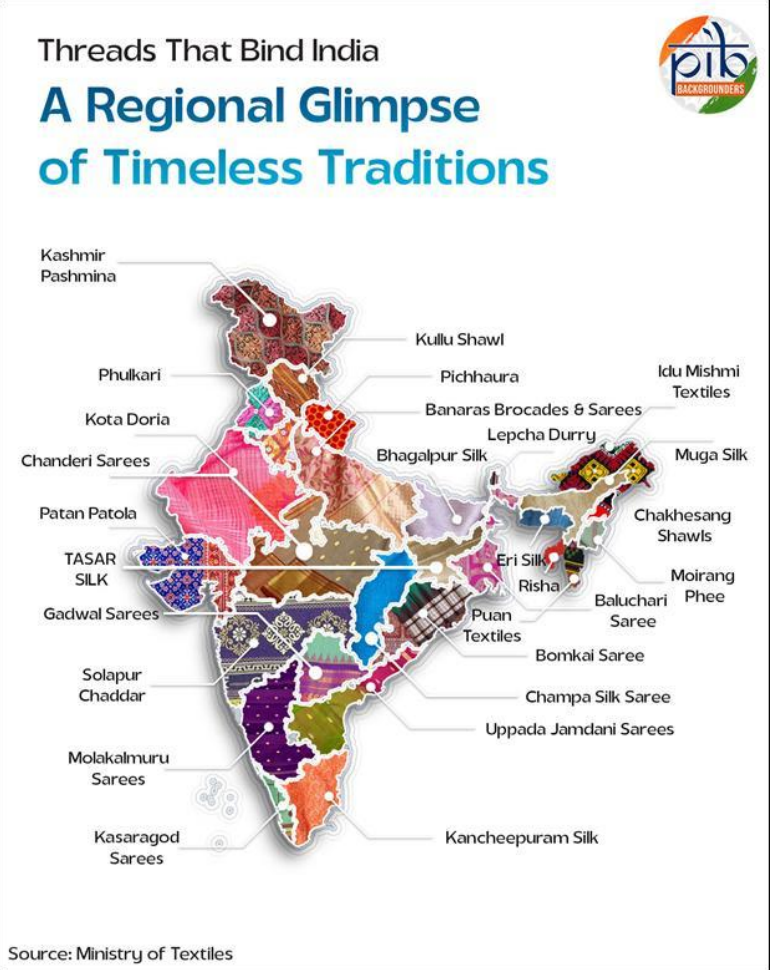National Current Affairs Switch to Hindi
11th National Handloom Day
Why in News?
On 7th August 2025, the Ministry of Textiles celebrated India's handloom sector during the 11th National Handloom Day (NHD), focusing on the theme 'Weaving Innovation into Tradition.'
- On 11th NHD, at Bharat Mandapam, the President of India presented the prestigious 5 Sant Kabir Handloom Awards and 19 National Handloom Awards for 2024.
National Handloom Day
- Established on 7th August 2015, NHD marks the momentous occasion of the Swadeshi Movement, which began on 7th August 1905, encouraging indigenous handloom weaving industries.
- NHD celebrates the skilled craftsmanship and creativity behind Indian handlooms, recognizing their significance as a cherished cultural legacy.
- In partnership with the National Handloom Development Corporation (NHDC), the Ministry also introduced the Exclusive Handloom Expo and the "Haat on Wheels" mobile retail initiative.
- The "Know Your Weaves Campaign 2025" was also launched by the Ministry of Textiles as a week-long event from 1st -7st August 2025 in celebration of National Handloom Day.
Handloom Awards
- About: The awards aim to honour excellence in the handloom industry, celebrating individuals and organizations that set benchmarks in craftsmanship, innovation, and contribution to the sector's development.
- Categories of awards:
|
Aspect |
Sant Kabir Handloom Award |
National Handloom Award |
|
Purpose |
Recognizes outstanding handloom weavers for significant contributions to sector growth and tradition. |
Celebrates weavers for exceptional craftsmanship, dedication, and innovation. |
|
Eligibility |
Outstanding handloom weavers; may include national/state awardees, merit certificate holders, or extraordinary contributors. |
Weavers with exemplary craftsmanship, innovation, and dedication. |
|
Cash |
Rs. 3.5 lakh |
Rs. 2 lakh
|
Handloom Sector
- About: The Handloom sector remains a cornerstone of India’s rural economy and cultural heritage, providing employment to over 35 lakh people, with 70% being women.
- Global Presence: India is the world's sole major producer of handloom fabrics at a commercial scale, accounting for nearly 95% of global handwoven fabric production.
- India’s handloom exports continue to find strong demand across global markets, reaching over 20 countries.
- In the financial year 2024-25, the United States remained the largest destination, accounting for ₹331.56 crore worth of exports.
- Major Schemes:
- National Handloom Development Programme (NHDP): It aims to promote the sustainable growth of handloom weavers in and outside recognised clusters by forming self-reliant and competitive units.
- Raw Material Supply Scheme (RMSS): It aims to support handloom weavers by ensuring the availability of quality yarn at affordable prices through the following key objectives and components.
- MUDRA Loan: This scheme offers subsidised loans to weavers through banks at a low interest rate of 6 per cent.
Uttar Pradesh Switch to Hindi
WHO–IRCH International Workshop
Why in News?
The Pharmacopoeia Commission for Indian Medicine and Homoeopathy (PCIM&H), Ministry of Ayush, hosted the inaugural session of the WHO–International Regulatory Cooperation for Herbal Medicines (IRCH) Workshops on “Safety and Regulation of Herbal Medicines” (Working Group-1) and “Efficacy and Intended Use of Herbal Medicines” (Working Group-3) at its headquarters in Ghaziabad.
- India, as the lead country for Working Groups 1 and 3, is committed to strengthening international regulatory cooperation through the WHO–IRCH platform.
Key Points
- About: The global technical workshop, organized jointly by the Ministry of Ayush and WHO, is being held from 6th to 8th August 2025, with senior representatives from WHO Member States, regulatory authorities, academia, research bodies, and the herbal medicine industry in attendance.
- Bringing together experts from across WHO Member States and Observer States, the workshops aim to deliberate on key aspects such as regulatory convergence, quality assurance, and the clinical relevance of herbal medicines in traditional systems of healthcare.
- The agenda includes hands-on training sessions in herbal drug standardisation techniques such as pharmacognostic, chemical, and elemental analysis.
- Site visits to prominent Ayush institutions are also planned to provide international participants with first-hand exposure to clinical, academic, and manufacturing practices.
- The workshops have attracted participants from several countries under the WHO-IRCH umbrella, including Poland, Nepal, Bhutan, Brunei Darussalam, Japan, Indonesia, Sri Lanka, Paraguay, etc.
Pharmacopoeia Commission for Indian Medicine & Homoeopathy (PCIM&H)
- Pharmacopoeia Commission for Indian Medicine & Homoeopathy (PCIM&H), is a subordinate office under the Ministry of AYUSH, Government of India.
- Development of Pharmacopoeias and Formularies as well as acting as Central Drug Testing cum Appellate Laboratory for Indian systems of Medicine & Homoeopathy are the key fields of activity of PCIM&H.
International Regulatory Cooperation for Herbal Medicines (IRCH)
- International Regulatory Cooperation for Herbal Medicines (IRCH), established in 2006, is a global network of regulatory authorities responsible for regulation of herbal medicines.
- Its mission is to collaborate and share the best practices to help WHO in its recommendations to the members on improving the regulation of herbal medicines as well as raise awareness regarding their safe use in health and wellbeing.
Maharashtra Switch to Hindi
Maharashtra Plans NCC-Style Training for Students
Why in News?
Maharashtra’s school education minister announced the introduction of training inspired by the National Cadet Corps (NCC) for students beginning in Class 1.
Key Points
- Objective: The initiative aims to foster discipline and patriotism among students from the primary level, with a broader vision of developing well-disciplined and nation-conscious citizens.
- Training Details: The training will be military-style and NCC-inspired, focused on instilling discipline and patriotism.
- The program will be introduced at the primary school level, starting with Class 1.
- Collaboration and Expansion Plans: The state government will request the central government to increase the number of NCC training centres in Maharashtra.
- The state plans to collaborate with the ex-servicemen welfare board to enlist retired armed forces personnel for training.
- This year’s Independence Day celebrations in schools will also include parade drills performed to patriotic songs.
- Current NCC Framework in Maharashtra:
- Maharashtra currently has 7 NCC groups and 63 active units, covering 1,726 schools and colleges with over 1.14 lakh cadets.
- There are plans to expand the NCC program by adding 10 more NCC centres, which will provide an opportunity for an additional 20,314 students to participate.
National Cadet Corps
- About: The NCC is a voluntary Tri-Services organisation (Army, Navy, and Air Force) under the Ministry of Defence, headquartered in New Delhi, established by the NCC Act, 1948.
- It is the largest uniformed youth organisation globally, with over 15 lakh cadets across the country.
- Objective: It aims to groom the youth into disciplined, patriotic, and responsible citizens.
- Role in Wars & Reforms: During the 1965 and 1971 Indo-Pak wars, NCC cadets supported defence efforts by guarding vital areas, aiding in logistics, and assisting in rescue and traffic control.
- Post-1971, NCC reoriented towards leadership, social service, and nation-building, reducing its focus on combat training.
- Structure & Training: Headed by a Director General (rank of Lieutenant General).
- Enrolment from high schools, colleges, and universities across India.
- Cadets receive basic military training, and certificates (A, B, C) enhancing eligibility for military recruitment.
West Bengal Switch to Hindi
‘Binamrata’ Initiative
Why in News?
On 4th August 2025, the Department of Posts (West Bengal Circle) in partnership with the Philatelic Congress of India and Rotary International, supported the heartwarming letter-writing initiative ‘Binamrata’.
Key Points
- About: The ‘Binamrata’ initiative aimed to revive the art of handwritten letters, focusing on personal expressions of gratitude.
- This unique project invited students of Classes IX and X to pen handwritten letters to their parents or teachers, expressing their heartfelt gratitude, reviving the nearly forgotten charm of personal correspondence.
- More than 5,000 students from 63 schools across the state participated in the event, showcasing deep emotional connect and creativity through their letters.
- Other Initiatives: In its continued efforts to promote the art of letter writing in the age of social media, the Department also organizes other annual competitions such as Dhai Akhar Letter Writing Contest and the UPU International Letter Writing Competition for Young People.
Philatelic Congress of India (PCI)
- The Philatelic Congress of India (PCI) is the National Philatelic Federation of Philatelists and Philatelic Societies in India.
- It was formed in Calcutta (Kolkata) on 29th December 1975 during the National Philatelic Exhibition INPEX-1975.
- PCI was established as a National Federation in consultation and association of the Department of Post (DOP).
Rotary International
- Rotary is a global network of more than 1.2 million neighbors, friends, leaders, and problem-solvers who see a world where people unite and take action to create lasting change – across the globe, in our communities, and in ourselves.





 PCS Parikshan
PCS Parikshan


